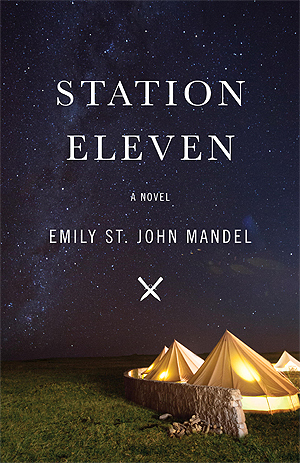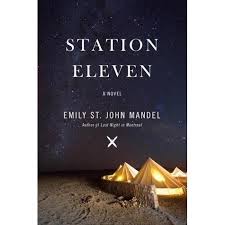
“Couldn’t put it down,” my son says, leaving Station Eleven on a chair outside my door, which is propped open a few inches with – what else – a book. A friend sent him the novel, urging him to read it. We talk about it through the glass door for a few minutes, but it’s cold outside and my son returns to the apartment he’s living in, temporarily, in the complex next to ours.
His being here has given my life a small, gratifying purpose during the pandemic; I enjoy cooking hot meals for him, which we leave in a paper bag on our front stoop or deliver to his doorstep.
Look, I’m a mom. I’d hoped our son would choose to take a break from the NYC borough and neighborhood he’s loyal to – a place that still has obscene daily death tolls. But it was up to him. We were lucky to find a place in Rochester where he could land (and quarantine for a couple of weeks in case he’s a carrier.)
“Think of it as an artist’s residency,” I’d said. “You can work on your photo editing.”
I pick up the copy of Station Eleven, wipe it down even though it’s a paperback. What’s great about having had Books Can Save a Life for over eight years is, I can go back to see what I wrote about a book years ago. Some books shine the more time passes. Below is what I wrote about Station Eleven in 2014: I’d choose different excerpts now, and in fact have added one at the end that is a bit of a spoiler, but which has remained emblazoned in my memory over the years.
I get that some of you can’t bear to read about a pandemic now. One reason you might choose to is Emily’s transcendent concluding chapter that celebrates youth and a vision for a different, hopefully better, world. But of course I understand if pandemic books are not the thing for you at the moment!
I do urge you, though, to listen to six minutes of the magnificent Ursula K. Le Guin below. Sadly, she is no longer with us, but her words resonate in 2020. She passed away in 2018.
Here’s the post I wrote in 2014:
“On Day Seven the networks began to blink off the air, one by one. ‘So that all of our employees may be with their families,’ a CNN anchor said, ashen and glassy-eyed after forty-eight hours without sleep, ‘we are temporarily suspending broadcast operations.’ ‘Good night,’ NBC said an hour later, ‘and good luck.’ CBS switched without comment to reruns of America’s Got Talent. This was at five in the morning, and everyone who was awake watched for a few hours – it was nice to take a quick break from the end of the world – and then in the early afternoon the lights went out.” Station Eleven, Emily St. John Mandel
I’ve been reading dystopian fiction lately and looking forward to the third installment of The Hunger Games: Mockingjay. Just as I dipped into pandemic-ridden Station Eleven, Ebola was front and center in the news. Reality and fiction are getting too close for comfort.
Emily St. John Mandel’s Station Eleven, a National Book Award finalist, portrays a flu pandemic that kills 99.9 percent of the population in a matter of days. We see the end of advanced civilization through the eyes of five characters, and the first decades after the collapse.
Clark is a corporate consultant who specializes in coaching problematic executives and CEOs to change their behavior. Days before the outbreak of the Georgia flu, Clark interviews an especially perceptive employee to see what others think of a particular manager. I love this exchange:
“‘….it’s like the corporate world is full of ghosts. And actually, let me revise that, my parents are in academia so I’ve had front-row seats for that horror show, I know academia’s no different, so maybe a fairer way of putting this would be to say that adulthood’s full of ghosts.'”
“‘I’m talking about these people who have ended up in one life instead of another and they are just so disappointed. Do you know what I mean? They’ve done what’s expected of them. They want to do something different but it’s impossible now, there’s a mortgage, kids, whatever, they’re trapped. Dan’s like that….but I don’t think he even realizes it. You probably encounter people like him all the time. High-functioning sleepwalkers, essentially.'”
What was it in this statement that made Clark want to weep?
“…you go on like that, looking forward to five o’clock and then the weekend and then your two or three annual weeks of paid vacation time, day in day, and that’s what happens to your life.”
“Right,” Clark said. He was filled in that moment with an inexpressible longing.
“Guys like Dan, they’re like sleepwalkers,” she said, “and nothing ever jolts them awake.”
Clark, of course, is jolted awake in a very big way when his flight to Toronto is diverted to a small Michigan airport after the pandemic explodes. He and his fellow passengers, untouched by the flu, watch the end of life as they know it on television. They never leave the airport – it becomes their settlement, their home. Eventually, Clark establishes a Museum of Civilization, where people donate iPads and smart phones and other remnants of their now-lost advanced culture.
“Like educated children everywhere, the children in the airport school memorized abstractions: the airplanes outside once flew through the air. You could use an airplane to travel to the other side of the world, but….when you were on an airplane you had to turn off your electronic devices before takeoff and landing, devices such as the tiny flat machines that played music and the larger machines that opened up like books and had screens that hadn’t always been dark, the insides brimming with circuitry, and these machines were the portals into a worldwide network. Satellites beamed information down to Earth. Goods traveled in ships and airplanes across the world. There was no place on earth that was too far away to get to.”
Meanwhile, a roving theater troupe travels from town to town performing classical music and Shakespeare for groups of survivors living in abandoned Walmarts and gas stations. In this troupe are characters we’ve met earlier in the novel. The younger members only dimly remember a world with electricity and other marvels, and some were born after the collapse. One day, they arrive at Clark’s airport settlement, and there is a poignant reunion of sorts for Clark.
Station Eleven, among other things, asks whether art can save and redeem humanity. I can’t help but think of this outpouring of dystopian literature as the proverbial canary in the mine. A wake-up call for those of us who, like the characters in Station Eleven, may need it.
Here is another excerpt I’m adding to this post in 2020 (beware the spoiler):
“Miranda woke at four in the morning with a fever. She fought it off with three aspirin, but her joints were knots of pain, her legs weak, her skin hurt where her clothes touched her. It was difficult to cross the room to the desk. She read the latest news on the laptop, her eyes aching from the light of the screen, and understood….
It took a long time and considerable concentration to put on her shoes…..
Outside the air was heavy and still. A greenish light on the horizon, the beginnings of sunrise….She was thinking about the container ship on the horizon. The crew out there wouldn’t have been exposed to the flu. Too late to get to a ship herself now, but she smiled at the thought that there were people in this reeling world who were safe.”
*****
Ursula Le Guin, in her stirring National Book Award acceptance speech, said we will need more writers like Emily St. John Mandel who can imagine a different way of being. Six minutes well worth listening to.
Have you read Station Eleven? Do you have other pandemic literature to recommend? Stay well, everyone!


